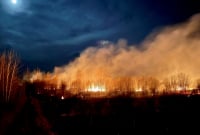Support strong Canadian climate journalism for 2025
As the Alberta election campaign heads into its final days, business groups are warning that increased divisiveness and political extremism poses a threat to the province's economic future.
"We're worried about societal and political polarization, overall. It seems to be a feature that has crept into North American politics," said Adam Legge, president of the Business Council of Alberta, in an interview.
"The future of this province depends on us getting our act together and being united from a policy standpoint, a public standpoint, and an economic standpoint."
Legge's organization, which counts among its members the CEOs of many of Alberta's largest companies, identifies as a non-partisan group. It hasn't endorsed any candidate or party that will be on the ballot Monday when Albertans go to the polls.
Neither has the Calgary Chamber of Commerce, another non-partisan business group. But Chamber president and CEO Deborah Yedlin said that like Legge, she's concerned about what she sees as a heightened level of us-against-them rhetoric this election cycle.
"What we're hearing from our members is they want collaboration. They want to see a higher level of cooperation when it comes to solving problems," Yedlin said.
"Our members don't want to see the fighting, the divisiveness."
Alberta's election comes at a time when the province is experiencing a level of economic and fiscal strength it hasn't seen since before the oil price crash of 2015.
Unemployment is at a seven-year low, and the province's dominant oil and gas sector is benefiting from commodity prices that — though down from last year's record heights — remain at profitable levels.
But business groups say the province also faces problems such as an ongoing labour shortage, a skills and training gap, and stagnant wages. In addition, Alberta's oil-and-gas-dominated economy faces the increasingly urgent challenge of climate change, with companies under immense pressure to decarbonize.
Yedlin said Alberta companies have the potential to be global leaders in new forms of energy such as hydrogen, as well as in emissions-reducing technologies such as carbon capture and storage. But she said there is no time to waste.
"We need to seize the moment in terms of what's possible, going forward," she said.
"We need deliberate, visible provincial support as well as deliberate, visible federal support in order for this to happen.”
Both Danielle Smith's incumbent United Conservative Party and Rachel Notley's New Democrats have rolled out campaign promises aimed at bolstering the economy. The UCP has proposed a $1,200 non-refundable tax credit for skilled tradespeople and professionals who choose to move to the province to work in fields that have labour shortages, while the NDP has pledged to eliminate the province's small business tax and create a capital investment tax credit for new emerging sectors.
Each party has also tried to paint itself as a champion of the energy sector — the UCP by highlighting its past record, including the introduction of the Alberta Petrochemical Program and the Alberta Hydrogen Roadmap, and the NDP by pledging to create a regulatory "fast pass" to support businesses with good records to get well-developed projects built sooner.
But during the campaign, economic issues have often taken a back seat to hyper-partisanship. Inflammatory comments about vaccines and convoys, as well as accusations of socialism and arguments about who is or is not a true conservative, have taken up more far more oxygen than issues of tax policy or economic diversification.
"Unfortunately this election has really been focused a lot on personality and not enough on the policy side of things," said Shauna Feth, president and CEO of the Alberta Chambers of Commerce.
"If we could get back to really focusing in on policy, maybe we could reduce some of that divisiveness."
Legge said he believes political polarization is a deterrent to capital investment as well as labour attraction and retention. He said whoever becomes premier next week will need to be able to find alignment within their own party, but also "alignment with Albertans."
"Albertans as a whole generally are centrists. People want to see a good future for their families and that's what we need to focus on," he said.
"The next premier will need to decide whether we're going to continue to fight amongst ourselves, or whether we're actually going to seize the opportunities that exist."
This report by The Canadian Press was first published May 25, 2023.




Comments